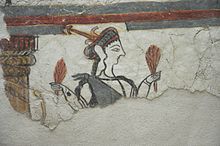Eritha | |
|---|---|
𐀁𐀫𐀲 | |
 | |
| Occupation(s) | Priestess, probably of Potnia, at Sphagianes |
| Years active | c. 1180 BCE |
| Known for | Dispute with the damos over the status of her landholdings |
Eritha (Mycenaean Greek: 𐀁𐀫𐀲, syllabic transcription e-ri-ta,[a] pronounced [ˈɛ.rɪ.tʰa]; fl. c. 1180 BCE) was a Mycenaean priestess. She was a subject of the Mycenaean state of Pylos, in the southwestern Peloponnese, based at the cult site of Sphagianes, near the palatial centre of Pylos.
As a priestess, Eritha held an elevated position in Pylian society. She is the more prominent of the two priestesses known from Pylos, and held economic independence and social prominence unusual for women in the Pylian state. She held authority over several other people, including at least fourteen women who were probably assigned to her by the palatial state as servants to assist with the distribution of religious offerings.
In the last year before the destruction of the Palace of Nestor at Pylos (c. 1180 BCE), Eritha was involved in a legal dispute over the status of her lands against the local damos, which represented the other landholders of Sphagianes. While the precise terms of the dispute are unclear, Eritha appears to have tried to argue that part of her landholdings were held on behalf of her deity, and consequently that she was entitled to lesser tax or other obligations than if they were her personal possession. The outcome of the dispute is unknown.
The record of Eritha's land dispute constitutes the longest preserved sentence of Mycenaean Greek and the first known legal dispute from Europe. It has been used as evidence for the status of women in the Mycenaean world, as well as for relations between the palace, religious organisation and civic society, and for the legal systems and infrastructure that existed in the Pylian state.
Cite error: There are <ref group=lower-alpha> tags or {{efn}} templates on this page, but the references will not show without a {{reflist|group=lower-alpha}} template or {{notelist}} template (see the help page).